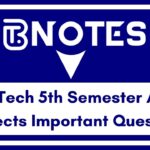The Bachelor of Technology (B.Tech) is a four-year undergraduate program that culminates in its final stages with a strong emphasis on specialization, practical application, and industry readiness. For Computer Science and Engineering (CSE) students, the 7th semester is a crucial stepping stone toward their professional careers, focusing on advanced elective courses, distributed systems, and significant practical components like internships or major projects.
This syllabus outlines a typical 7th semester curriculum for CSE, designed to deepen technical expertise and prepare students for real-world challenges in technology. While the exact structure may vary by institution, it reflects a balance of theoretical learning, elective flexibility, and hands-on experience essential for the transition to the final semester.
B Tech 7th Semester Syllabus
Duration: Approximately 5-6 months (including classes, labs, and exams).
Focus: Advanced specialization, industry preparation, and project work.
Theory Subjects
1. Distributed Systems
- Topics:
- Distributed Computing Models: Client-Server, Peer-to-Peer.
- Communication: RPC, Message Passing, Synchronization.
- Consistency and Replication: CAP Theorem, Eventual Consistency.
- Fault Tolerance: Failure Models, Recovery Techniques.
- Objective: Explores the design and implementation of distributed computing systems.
2. Elective – III (e.g., Blockchain Technology)
- Topics:
- Blockchain Basics: Decentralization, Cryptography, Hashing.
- Consensus Mechanisms: Proof of Work, Proof of Stake.
- Smart Contracts: Ethereum, Solidity Basics.
- Applications: Cryptocurrencies, Supply Chain.
- Objective: Provides in-depth knowledge in a cutting-edge CSE specialization.
3. Elective – IV (e.g., Internet of Things – IoT)
- Topics:
- IoT Architecture: Sensors, Actuators, Gateways.
- Protocols: MQTT, CoAP, HTTP.
- IoT Platforms: Arduino, Raspberry Pi Basics.
- Security: Data Privacy, Device Authentication.
- Objective: Introduces the integration of physical devices with computing systems.
4. Project Management
- Topics:
- Project Life Cycle: Initiation, Planning, Execution, Closure.
- Tools: Gantt Charts, PERT, CPM.
- Risk Management: Identification, Mitigation Strategies.
- Agile Methodologies: Scrum, Kanban.
- Objective: Equips students with skills to manage technical projects effectively.
Practical/Lab Subjects
| Lab/Project | Experiments/Activities | Objective |
|---|---|---|
| Distributed Systems Lab | Simulating distributed algorithms (e.g., leader election).Implementing message passing systems.Replication and consistency experiments. | Hands-on experience with distributed computing concepts. |
| Elective Lab (e.g., Blockchain/IoT Lab) | Blockchain: Creating a simple blockchain or smart contract.IoT: Building a sensor-based IoT application.Simulation using tools like Truffle or Node-RED. | Practical skills in elective specialization. |
| Industrial Training/Internship | Working on real-world projects in industry settings.Documentation of training experience.Presentation and viva voce. | Exposes students to professional environments. |
| Major Project – Phase I | Project proposal and feasibility study.Requirements analysis and initial design.Progress report submission. | Initiates the capstone project for the final year. |
Assessment
- Theory: End-semester exams (typically 60-70% weightage) + Internal assessments (assignments, quizzes, midterms; 30-40% weightage).
- Practicals: Lab performance, internship reports, project evaluations, viva voce.
- Credits: Each subject usually carries 3-4 credits (theory) or 1-4 credits (labs/projects), totaling around 20-24 credits for the semester.
Notes
- Variations: Elective options might include “Big Data Analytics,” “Cybersecurity,” or “Mobile Computing” instead of Blockchain or IoT.
- Branch-Specific: This is for CSE; other branches might feature “Industrial Engineering” (Mechanical) or “Power Electronics” (Electrical).
Conclusion
The 7th semester of the B.Tech program in Computer Science and Engineering is a pivotal phase that prepares students for their professional journey. With advanced topics like Distributed Systems and a wide range of electives such as Blockchain and IoT, it offers both depth and flexibility in specialization.
The inclusion of industrial training and the initiation of a major project bridges academic learning with industry practice, fostering skills in innovation and teamwork. Completing this semester equips students with the technical prowess and practical experience needed to excel in their final semester and launch successful careers in the ever-evolving field of computer science.
More Resource:






